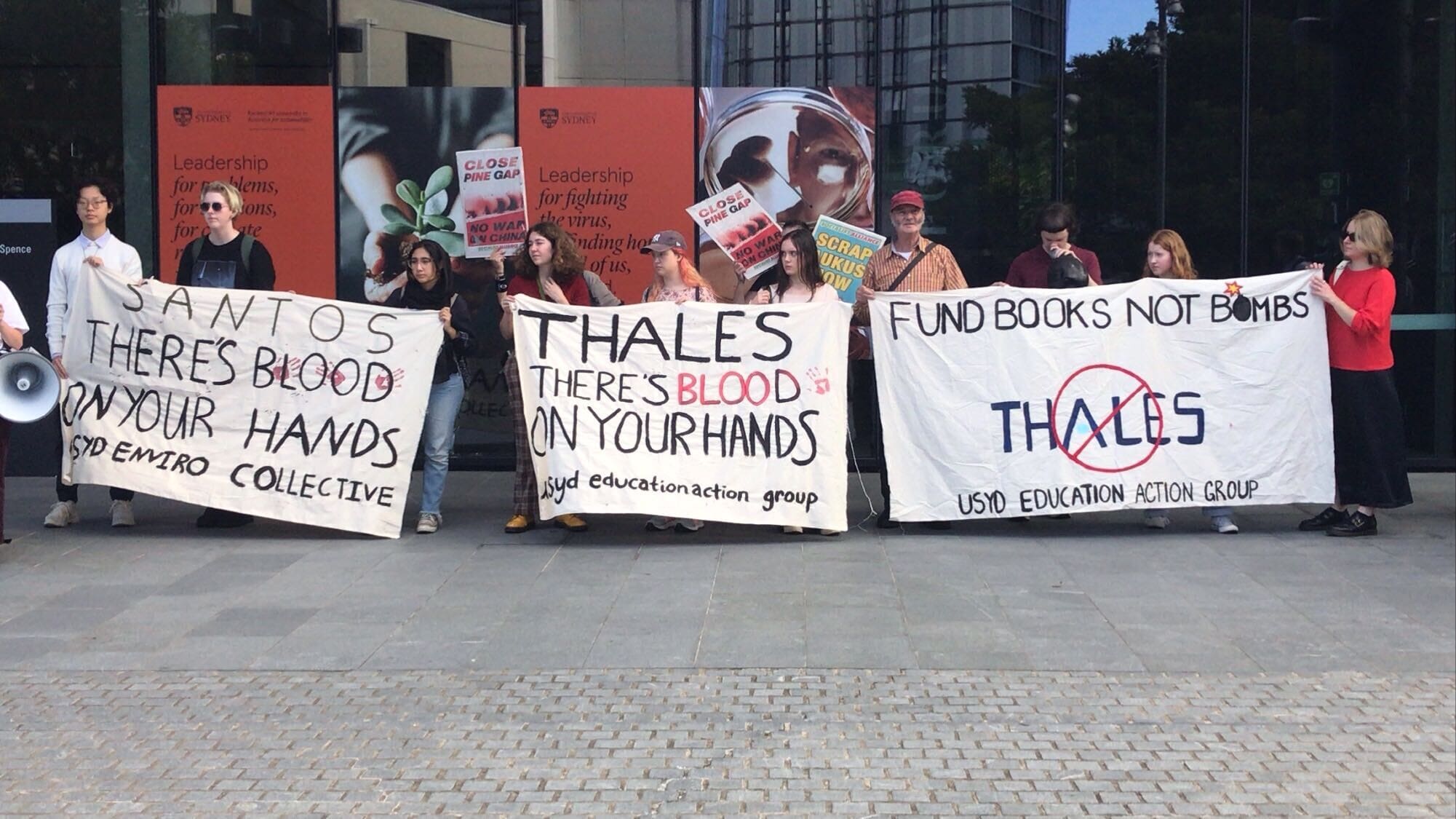Approximately 40 student activists and community members gathered in the Quadrangle today to protest the presence of French defence and security weapons manufacturer Thales Group and fossil fuel giant Santos on campus.
The rally was chaired by Students’ Representative Council (SRC) Environment Officer Simon Upitis and SRC Education Officer Ishbel Dunsmore, who noted that “It’s great to see people saying no to war and no to fossil fuels.”
The connection between war and fossil fuels was a key theme of the rally, from the demand to sever ties with both Thales and Santos, to their joint role in the destruction of the planet and people.
Simone Maddison, SRC Director of Student Publications and education activist, contextualised Santos as Australia’s largest supplier of natural gas. “Despite their best attempts to position themselves as leading the way in sustainability in the higher education sector, USyd’s greenwashing amounts only to bandaids covering their structural commitment to fossil fuels,” Maddison argued.
This structural integration of the fossil fuel industry is a key concern not just in Universities but across society, Maddison pointed out, as “The Native Title Tribunal last year ruled that the public benefit of Santos’ Narrabri Gas Project outweighed any cultural or environmental concerns of the Gomeroi people.”
The protestors marched briefly to the Quad Lawns where Jack Scanlan, SRC Disabilities Officer and education activist said that “Australia collectively has failed to fight the fossil fuel lobby.”
“Not only have we not fought it but the government has actively propped up what should be a dying industry with enormous subsidies, subsidies that dwarf historically what has been given to renewable energy,” Scanlan continued.
Nick Dean, long-time anti-war activist and convenor of the Marrickville Peace Group, connected war and the climate crisis, saying that “war is the very epitome of social and environmental destruction. Should the wars we are being told to expect break out, they will inevitably accelerate the climate crisis.”
“Military strategists and the governments they serve foresee instability on a global scale. They fear they may lose control and so how do they maintain it? Through the power that comes from the barrel of a gun.”
After marching to the F23 building, the crowd gathered outside the office of USyd Chancellor Belinda Hutchinson, who, as Dunsmore noted, is also the current Chair of Thales Australia.
In 2017, just two years after her appointment to their board, Hutchinson and the University signed a Memorandum of Understanding with Thales and in late 2022 they extended it, further enmeshing the University and the military sector.
SRC Education Officer Yasmine Johnson concluded the rally by condemning the higher education sector for their increasing militarism. Catriona Jackson, chief executive of Universities Australia, “recently spent a week in Washington offering the support of the higher education sector in preparing for war,” Johnson said.
“Students go to uni to get a quality education, not just to be churned out as a cog in the military machine, which is exactly what happens when unis have memorandums of understanding with weapons manufacturers.”
Johnson also denounced the Albanese government’s decision to spend “a further nineteen billion dollars as part of a ramp up in defence spending with a large proportion going towards enhancing Australia’s long-range missile strike capacity. This is in addition to the [over] $360 billion already committed to the AUKUS submarines.”
Rally organises urged attendees to attend the 6 May march against the Port Kembla nuclear base and a protest of the Quad leaders’ summit at Town Hall 6pm Tuesday 24 May.





